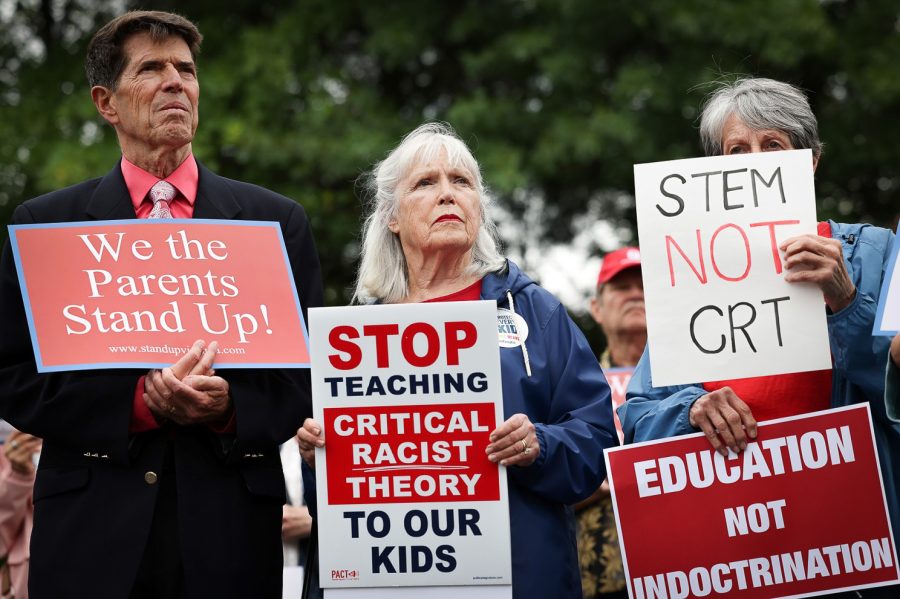Professionals Make Curricula, Not Parents
It is not uncommon to hear students complain about their courses and express their displeasure in the school curriculum. Parents have also recently picked up this behavior nationwide as they challenge the content being taught to their children in schools. They have gone as far as to pursue, often successfully, the prohibition of certain material from being taught, such as The 1619 Project, a journalistic book that exposes some of the harshest realities and lasting consequences of slavery. Parents should not be given the power to decide school curricula, as they often possess political motivations, do not have the necessary qualifications and drive polarization.
There has been a rise in campaigns against teaching critical race theory (CRT), which covers antiracism and racism’s ubiquitous position in our institutions. Similarly, a bill in Florida, which opponents have coined the “Don’t Say Gay” bill to limit teachers’ ability to discuss sexual orientation and gender identity in the classroom, has become frighteningly popular among parents.
At its core, both of these movements are more complex than dissatisfaction with the material. Dominic Hashem (II) explains that these parents’ response is unsurprising as “they are trying to regress the improvements that have been made to history curriculums. [The banning of] CRT and ‘Don’t Say Gay’ bill are both reactionary moves that are another sort of ‘white panic moment.’” Many concerned parents are only becoming involved because of the political consequences, rather than a genuine concern about their children’s academic future.
Decisions concerning the school curriculum should not be left to parents, as many are not qualified in this field. Most parents have no experience in deciding what should be taught in schools. When they attempt to change the material, it often comes from a place of bias. Their own opinions interfere with what is being taught to their children. Parents should simply support their students as they learn.
Boston Latin School English teacher Ms. Lynn Burke supports this idea, stating that, even as a teacher, her “job as a parent is to make sure my children are safe and respected at school and help them to navigate any challenges that arise.”
The people that have and should decide the curriculum are qualified professionals. These experts have earned degrees, received extensive and continuous training and spent immense amounts of time and effort to formulate quality curricula.
Curriculum designs vary among different states and districts, but, ultimately, districts design the curriculum with the assistance of experts. Many experts have years of experience shaping the content they are given, and this is important in the development of material.
Parents may promote not only substandard but also harmful education. The purpose of sending their children to school is not to master trigonometry or Freudian theories, but rather to prepare them to be better citizens for the future. If instructors are forbidden from teaching relevant and critical material, the resulting ignorance will be a significant barrier to the fundamental purpose of school — responsible citizenship.
Teaching children to be mindful citizens is essential among an increasingly polarized nation. Children are not born with prejudices; bigotry and hatred, in forms such as racism and homophobia, are passed down through community environments, the media and more. As many parents also actively ingrain these problematic mindsets, hatred is accumulated and magnified among each generation. Thus, anti-hate and proper history education are necessary to unlearn these biases. This cannot happen if the people that perpetuate the hatred in the first place are allowed to determine what is taught in schools.
On the other hand, there are still parents who are genuinely interested in changing the curriculum for the better. There must be a balance in which parents do not control the content, but are still included in the discussion. This has been the case for BLS English teacher Mr. Robert Oakes, who explains that “in [my] 25 years of teaching, I have never had a parent interfere with my teaching. To be sure, I’ve had conversations with parents about the material, but no one has ever challenged what I am doing in the classroom.”
Instead of allowing parents to directly dictate curricula, BLS parents can voice their suggestions in the School Parent Council and School Site Council. For instance, when parents advocated for the return of the eighth-grade science course five years ago, it was initially approved for students to have science class three days out of the six-day rotation. The following year, it was fully incorporated so that they take it every day, allowing them to learn the material more effectively.
Ultimately, the growing retaliation from parents against curriculum being taught in schools is bringing light to the question of whether parents have the right to determine school education. In order to create the most fair and educational material, parents should not be given the reins, but rather, avenues in which they can express their opinions.







